As Bruce Lee once said: “I fear not the man who sets his alarm for 4:30, but I fear the man who doesn’t hit snooze.”* Ok, Bruce Lee didn’t say exactly that, but he knew discipline is king. So, how disciplined are you about your work-from-home routine?

The awful truth is, motivation is overrated. That’s why in today’s guide we discuss the role of self-discipline in building a reliable and crisis-proof work-from-home routine.
☕️ Grab that coffee and read some more… This article is part of our series on how to stay productive at home. Be sure to check other stories when you’re done reading.
- 🎮 How to Manage and Beat Distractions at Home
- 🛌 Slacking at Home? End WFH Procrastination With These Tips
- 📓 Work From Home: A Pocket-Sized Guide
- 🏡 Designing a Minimalist Home Office in 6 Easy Steps
🥊 The Difference Between Motivation and Discipline
The American Psychological Association defines motivation as “the impetus that gives purpose or direction to behavior.”(1) The impetus can be extrinsic, like money or rewards, or intrinsic, like a feeling of accomplishment following a promotion.
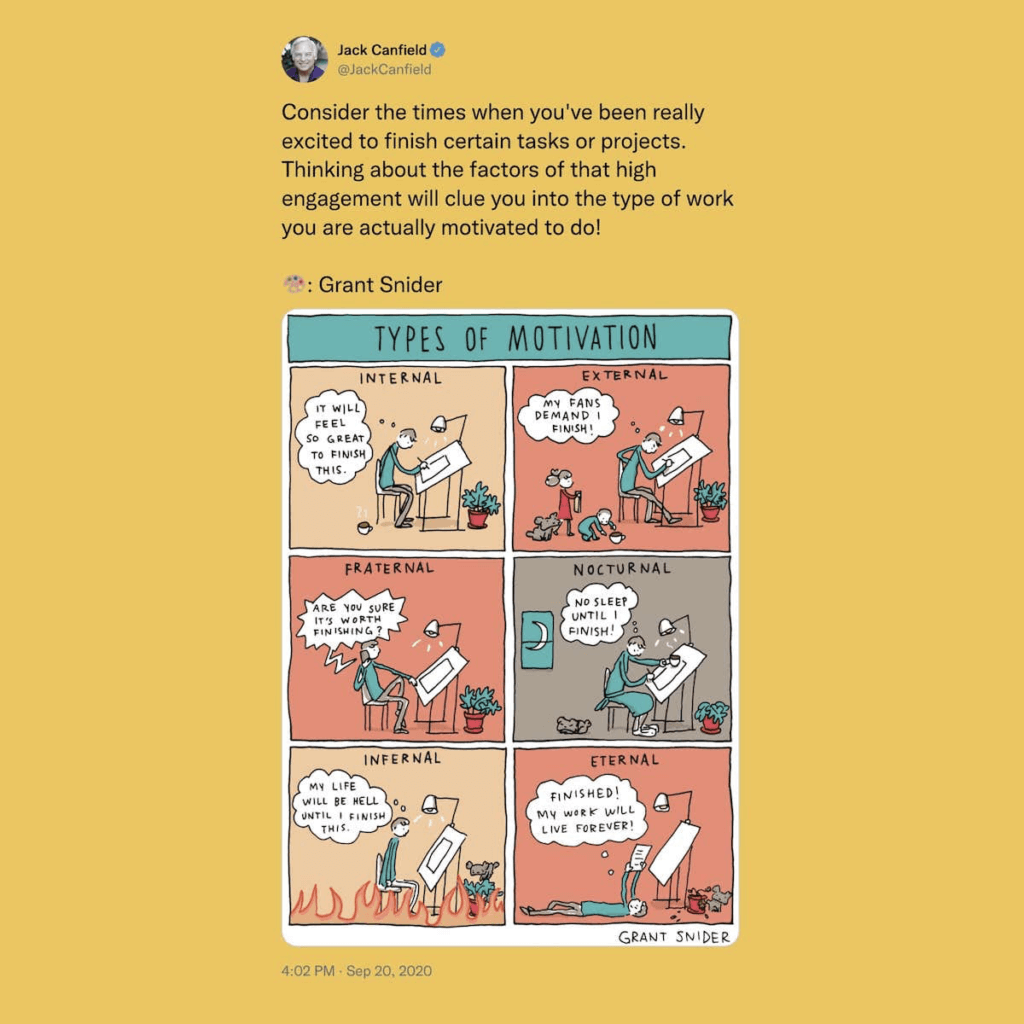
Self-discipline, on the other hand, is defined as “the control of one’s impulses and desires, forgoing immediate satisfaction in favor of long-term goals” or “resolute adherence to a regimen or course of action in order to achieve one’s goals.“(2)
Metaphorically, motivation is like a batch of fresh coffee beans. It smells good, tastes even better, and gives you a short-term energy boost when consumed in moderation.

Self-discipline is more like a muscle. The more you use it, the stronger and more reliable it becomes. Come hell or high water, it’s there for the heavy lifting.

Motivation—New Year’s resolutions are a good example—pushes you to sign up for a gym membership. Discipline compels you to attend every single week. Motivation gets you to try a new workout routine. Discipline helps you improve your technique.
You get the idea.
Motivation is easy and fun. It gives you instant pleasure and a feeling of accomplishment. Self-discipline is hard and unrewarding, at least in the beginning.
“So, why should I care?” 🤔
⛽️ Your Work-From-Home Routine Runs on Discipline
Flexible schedule is a double-edged sword. On the one hand, you get to work when you feel the most productive. On the other, finding intrinsic motivation to resist all the wonderful temptations lurking at home is not for the faint of heart.

And this is where discipline comes into play.
A 2020 study on effective remote working during the COVID-19 pandemic found self-discipline to be a key “moderator” in overcoming remote-work challenges.
“As an attribute that helps remote workers to mitigate the destructive effects of interruptions, self-discipline has been widely considered as an important and necessary skill for achieving remote working effectiveness .”(3)
But overcoming temptations is only part of the picture. Unlike temporary change spurred by motivation, a work-from-home routine built on discipline persists.
A former Navy SEAL turned podcaster turned entrepreneur Jocko Willink starts his day at 4:30 with a grueling workout. He even posts a picture of his watch on Twitter.
His motto? 👉 “Discipline Equals Freedom.”
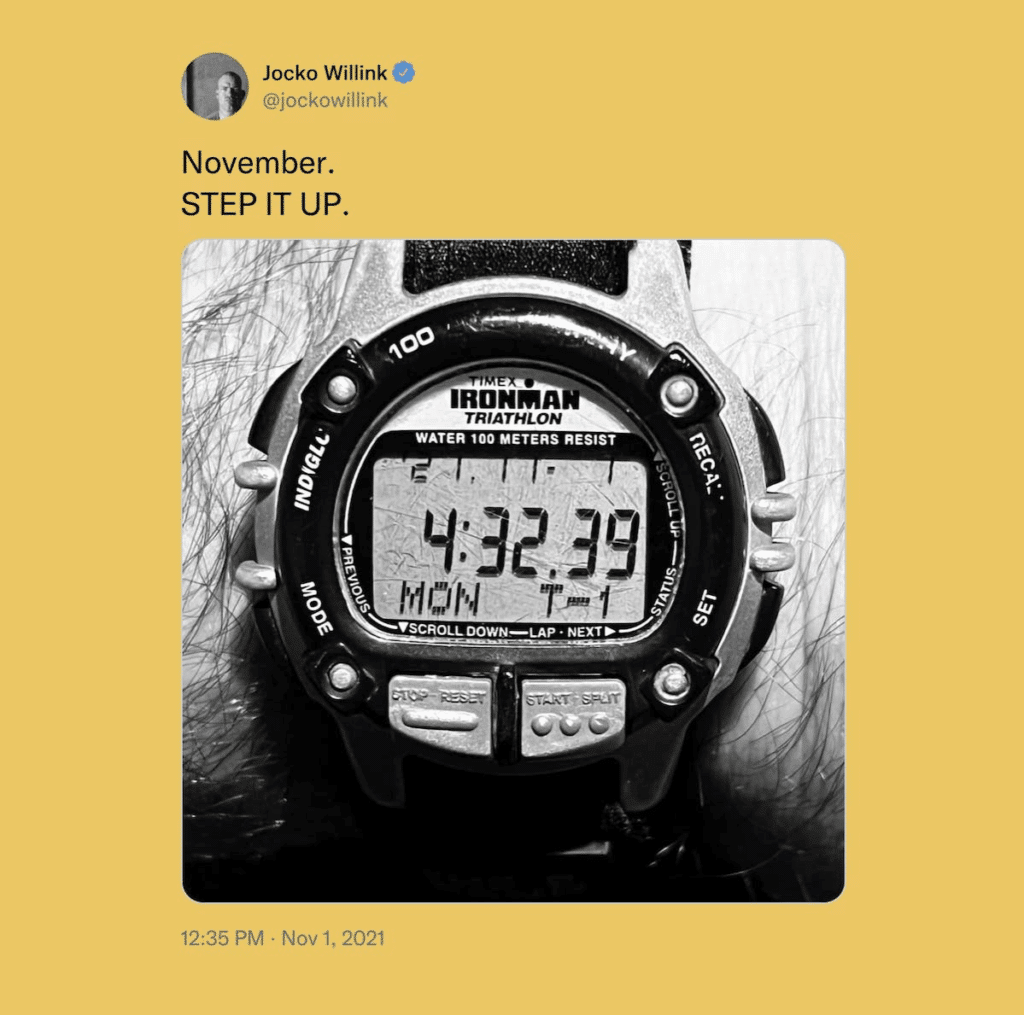
Does it suck to get out of your PJs and start working at 4 am? But it’s equally liberating to wrap a day’s work when everybody else is still having their lunch break.
Is it tough to tackle the most difficult tasks first? Yes, but it also means you’ll have less to worry about later in the day. Because discipline does equal freedom.
Here’s how you can fuel your work-from-home routine with high-octane discipline. 👇
🏃♀️ Work-From-Home Routine in Four Steps
1. Set Your Darn Schedule (Seriously)
“One of the best mental disciplines for people to implement is simply putting together a schedule or a task list and actually executing it.”
Jocko Willink
It doesn’t matter if you’re a writer, accountant, or an artist. If you work on your own—read: there’s nobody around to tell you what to do—you have to create and adhere to your own schedule. That’s the only way to stay on track and get work done.
Tropic of Cancer author Henry Miller came up with a list of eleven commandments that were supposed to help him with his writing routine. One of the rules said “Work according to program and not according to mood. Stop at the appointed time!”(4)
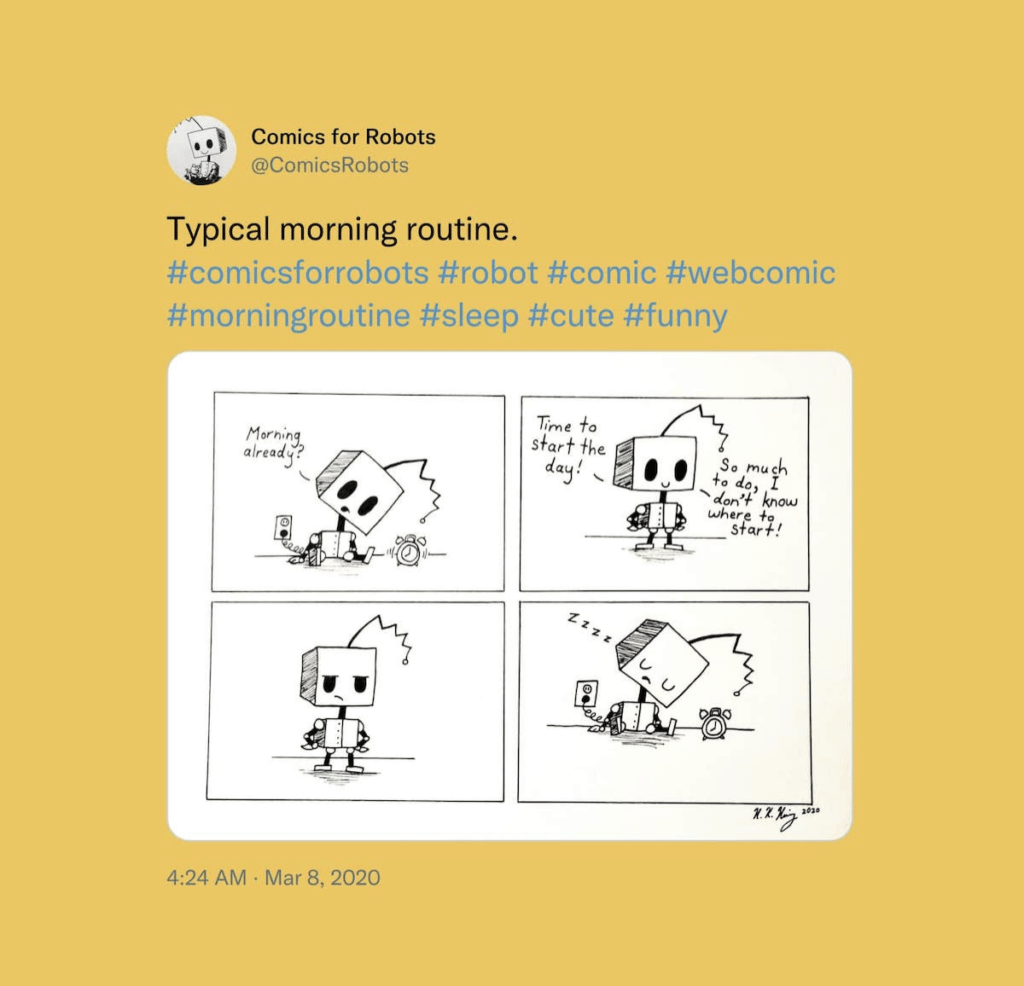
Charles Dickens was another stickler for routines. As his son recalled: “No city clerk was ever more methodical or orderly than he; no humdrum, monotonous, conventional task could ever have been discharged with more punctuality […].”(5)
The lesson for today?
Setting a schedule is meant to give you something to fall back on when your willpower runs dry. It’ll also help you track how you spend your time throughout the day and how much of it goes to waste on unproductive pursuits.
2. Put Your Routine on Rails
“In a special operations mission, the concept of speed is simple. Get to your objective as fast as possible. Any delay will expand your area of vulnerability.”
Admiral William H. McRaven, Make Your Bed
Your self-discipline isn’t just expressed in your adherence to a set routine. It’s also reflected in the number of distractions you’re willing to part with.
Did you know that poet and civil rights activist Maya Angelou did much of her writing in hotel rooms? She would rent a room and start writing by six-thirty, day in, day out.
“I insist that all things are taken off the walls. I don’t want anything in there. I go into the room and I feel as if all my beliefs are suspended. Nothing holds me to anything. No milkmaids, no flowers, nothing.”(6)
While you probably don’t need to rent a hotel room, you should remove as many home office obstacles as possible. Keep books, video games, and most importantly, your phone, at a safe distance. Paradoxically, the more friction you create, the better.
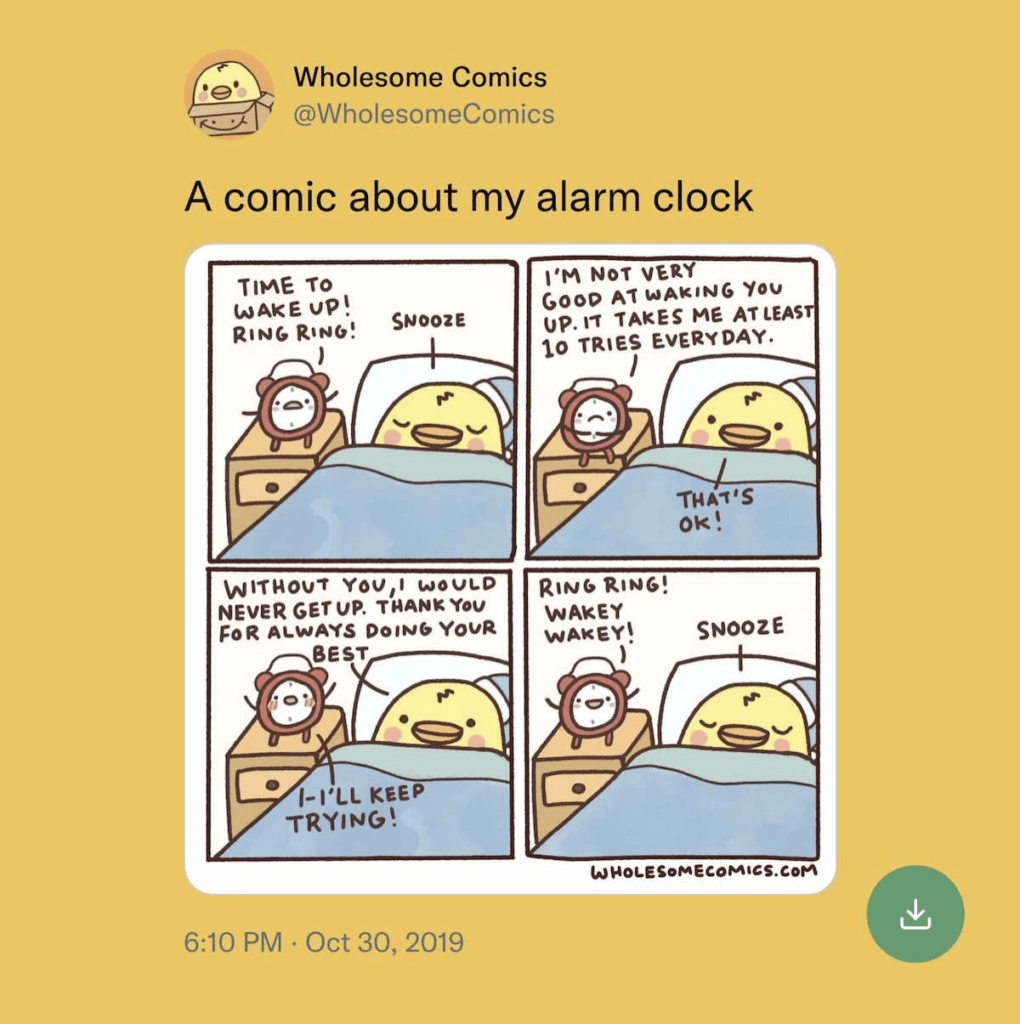
And speaking of friction. If you find yourself using the snooze function way too often, keep your phone away from your bed. Better still, keep it in another room so you can’t reach out for it too easily.
3. Train the Body to Train the Mind
“We should not exercise the body without the joint assistance of the mind; nor exercise the mind without the joint assistance of the body.”
Plato
A 2010 study found that self-control is like a muscle that can be reinforced by small acts of conscious effort. That could include abstaining from junk food or exercising, both of which are effective for strengthening self-discipline.
“Participants who practiced self-control by cutting back on sweets or squeezing a handgrip exhibited significant improvement in stop signal performance relative to those who practiced tasks that did not require self-control.”(7)
Japanese novelist Haruki Murakami took up running when he was 33 years old and has kept at it for almost 40 years. What started as an attempt to counter the effects of a sedentary lifestyle turned into part of his work-from-home routine.
“Now, whenever I feel like I don’t want to run, I always ask myself the same thing: You’re able to make a living as a novelist, working at home, setting your own hours. You don’t have to commute on a packed train or sit through boring meetings. Don’t you realize how fortunate you are? Compared with that, running an hour around the neighborhood is nothing, right?”(8)
In a letter to his wife, Kurt Vonnegut described his routine that included swimming, push-ups, and sit-ups. While Vonnegut was probably half-joking about it—his regimen included belts of Scotch—he did make physical activity part of his schedule.(9)
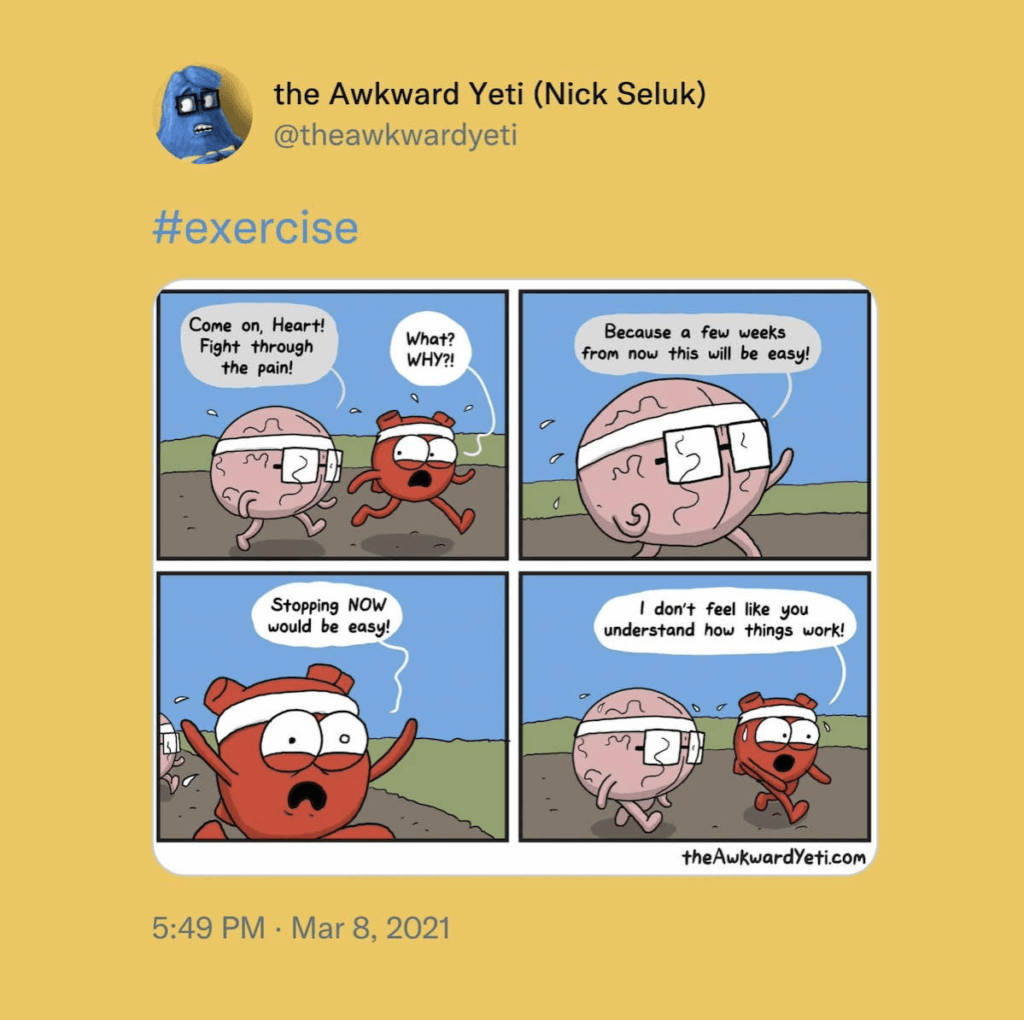
The bottom line is, physical effort invigorates the mind. By incorporating exercise into your work-from-home routine, you’ll build resistance against typical home-office obstacles. Plus, you may just feel a tad better after some huffing and puffing.
4. Accept Defeat
“Defeat is not the worst of failures. Not to have tried is the true failure.”
George Edward Woodberry
Ok, let’s hit pause for a moment. Self-discipline and perseverance are key, but sometimes you may find yourself paddling in the wrong direction. So, how do you know when it’s time to regroup, debrief, and adjust your strategy?
Ben Franklin, the original self-made man, is a fine example of making peace with defeat. At some point in his life, Franklin created a self-improvement model based on 13 “virtues” that was meant to help him attain moral perfection.
Long story short, Franklin’s method did help him improve many flaws of his character. But he also learned that a 10/10 success ratio is not the overarching goal.
“Despite these challenges, he kept working toward this goal throughout his life, but found that it was too much to expect perfect mastery of even this loose set of moral virtues. Franklin did not, however, subject himself to harsh punishment for his transgressions, nor did he see any value in feeling guilty about them.”
“Learning from Franklin’s Mistakes: Self-Interest Rightly Understood in the Autobiography”(10)
Depending on your work-from-home routine, “defeat” may mean different things. You may get upset when you don’t hit the gym at 5:30 once in a while. You may feel discouraged when you give in to video games or Netflix instead of working.

And that’s perfectly ok. Because building self-discipline is a lifelong project. Defeat and reflection are natural parts of the process.
👋 Parting Words
Motivation is volatile and elusive. That’s why building a successful work-from-home routine with motivation as a catalyst is not enough. After all, you can’t sit 8 hours straight with your face glued to the screen watching motivation videos, can you?
Discipline, on the other hand, has your back 24/7. Discipline, and adherence to your work-from-home routine, will help you overcome obstacles when motivation runs out. And that’s the best scaffolding you can hope for during trying times.
- ⏰ Step #1: Set your schedule
- 🚊 Step #2: Put your routine on rails
- 💪 Step #3: Train the body and the mind
- 🏳 Step #4: Accept defeat
Till next time!
*The actual quote goes like this: “I fear not the man who has practiced 10,000 kicks once, but I fear the man who has practiced one kick 10,000 times.”
🤖 Custom AI Agents: Tired of working alone? Deploy your own team of AI agents to support productivity and automate your workflow.
🪄 AI Generator: Tasks, projects, mind maps, flowcharts — generate high-level project structures in seconds, powered by GPT-4 Turbo.
✏️ AI Assistant: Need a writing assistant that has your back 24/7? Use powerful /AI commands in the project editor to write and edit faster.
🗂️ AI Prompt Templates Library: Explore a wide range of AI prompt templates designed for personal and business projects.
And much more…
🔗 Resources
- https://dictionary.apa.org/motivation
- https://dictionary.apa.org/discipline
- https://iaap-journals.onlinelibrary.wiley.com/doi/10.1111/apps.12290
- https://stevenpressfield.com/2012/05/henry-millers-eleven-commandments/
- https://www.masoncurrey.com/daily-rituals
- https://www.theparisreview.org/interviews/2279/the-art-of-fiction-no-119-maya-angelou
- https://pubmed.ncbi.nlm.nih.gov/20401323/
- https://www.harukimurakami.com/book/what-i-talk-about-when-i-talk-about-running-a-memoir/
- https://www.themarginalian.org/2012/11/05/kurt-vonnegut-daily-routine/
- https://www.jackmillercenter.org/wp-content/uploads/2014/03/Read-the-FULL-article-here.1.pdf



 How to Plan Effective Project Team Meetings: Strategies for Success
How to Plan Effective Project Team Meetings: Strategies for Success  14 Best AI Tools for Planning and Running Meetings
14 Best AI Tools for Planning and Running Meetings  Creating Customer Service SOPs: A Guide for Streamlining Your Support
Creating Customer Service SOPs: A Guide for Streamlining Your Support  15 Top AI Content Marketing Tools for Remote Teams
15 Top AI Content Marketing Tools for Remote Teams 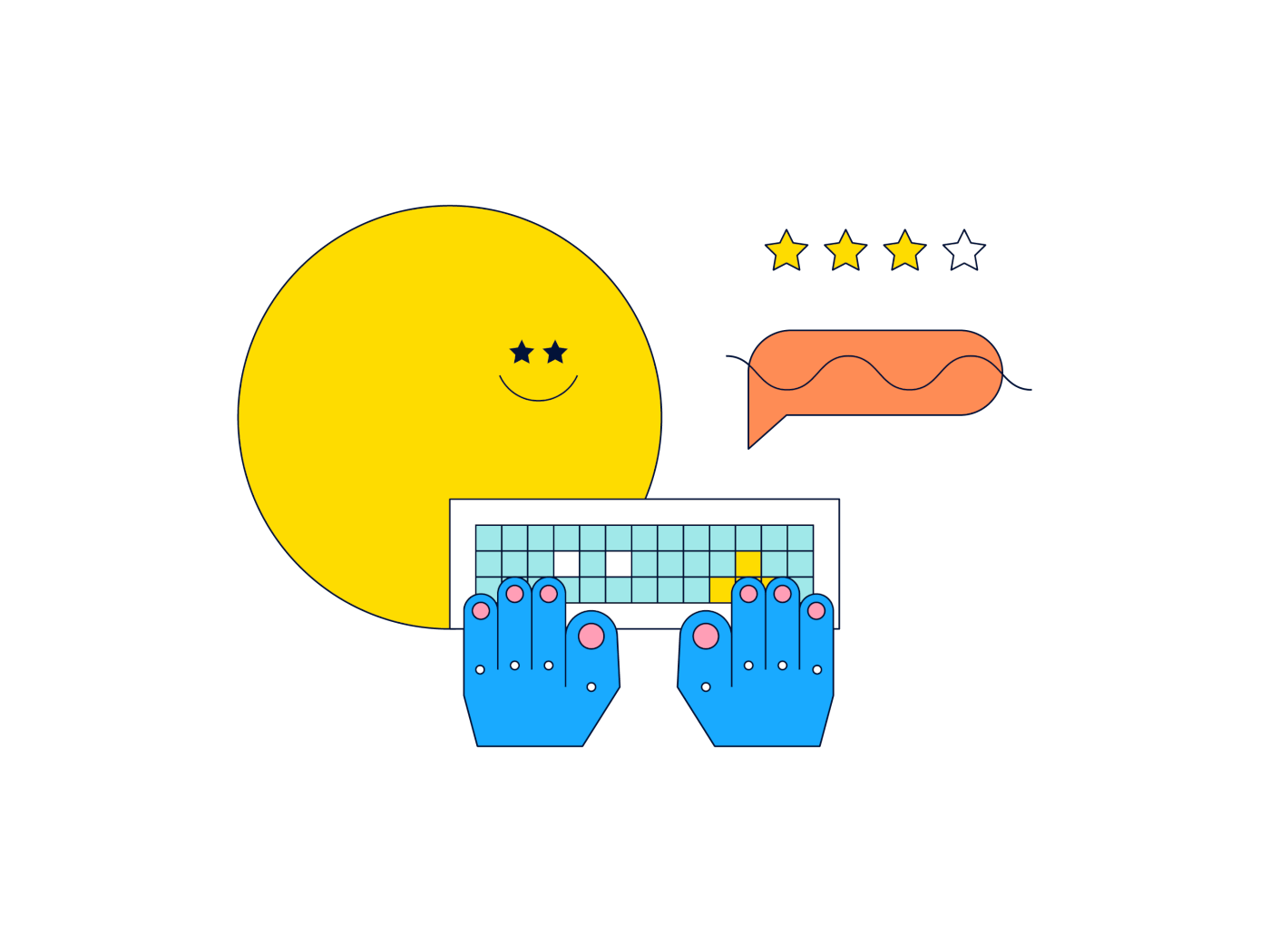 9 Top AI Brainstorming Tools for Virtual Teams in 2025
9 Top AI Brainstorming Tools for Virtual Teams in 2025  14 Best AI Collaboration Tools for Remote Teams (Updated 2025)
14 Best AI Collaboration Tools for Remote Teams (Updated 2025)